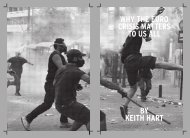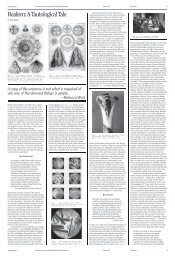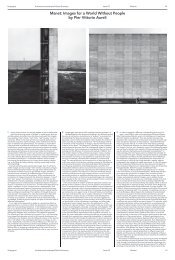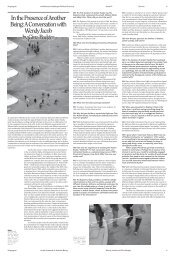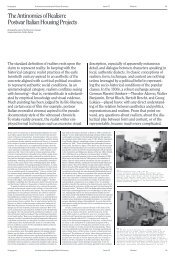Full Issue - Scapegoat
Full Issue - Scapegoat
Full Issue - Scapegoat
Create successful ePaper yourself
Turn your PDF publications into a flip-book with our unique Google optimized e-Paper software.
<strong>Scapegoat</strong> Architecture/Landscape/Political Economy<br />
<strong>Issue</strong> 01 Service<br />
2<br />
Urban Politics: Short Course<br />
by Kanishka Goonewardena<br />
Toronto today is not a happy place for those thinking radically about the politics of<br />
the city. However, the least of their worries should have to do with the election of a<br />
right-wing, populist mayor last fall, a rude awakening for liberal spirits, who got another<br />
wake-up call the day after May Day this year when the Conservatives won the<br />
federal election with a much-feared absolute majority in a flawed electoral system.<br />
As Stefan Kipfer argued insightfully in The Bullet days before the mayoral election,<br />
Rob Ford’s victory in October 2010 should not be seen as such a radical departure<br />
from the business as usual of the previous regime of David Miller. 1 For Ford barged<br />
in through a door already left ajar in the City Hall of Miller, who presided for two<br />
terms over a contradictory “social-democratic” compromise between neoliberal economics<br />
and cultural liberalism. What was left for Ford to do was tap into the evident<br />
discontent with the injustices of this uneven Third Way urbanism, opportunistically<br />
exploiting its cultural elitism and strategically appropriating its neoliberal pragmatism<br />
in order to roll out his own brand of authoritarian populism. 2<br />
Much ink has been spilt by some disoriented liberals in<br />
attributing Fordism in Toronto to a suburban-urban vote split,<br />
running the risk of blaming its enviable electoral success on<br />
those out-of-downtowners who just could not vote like the<br />
more enlightened “creative class.” But their neat statistics and<br />
beautiful maps alone say nothing about the production of the<br />
conditions that enabled the possibility of Ford. Just under a<br />
month before Ford’s election victory, Rick Salutin was right to<br />
insist: “What matters isn’t what one thinks of him; it’s understanding<br />
why he has bloomed so sturdily at this point.” 3 The<br />
enabling forces of Ford had been in the making for a while<br />
during Miller time, to be sure, and they will likely outlast<br />
Ford as well. These include, above all, the hardcore practices<br />
of Toronto’s neoliberal urbanism: the cynical subjection of<br />
urban planning to real estate capital; the progressive erosion<br />
of public spending on housing, transit and social services; and<br />
the aggressive policing of racialized suburban poverty in concert<br />
with the aestheticized embourgeoisment of the inner city.<br />
None of this would have flown so stealthily under the radars<br />
of those now viscerally outraged by Ford, however, without<br />
the regnant ideology of Toronto.<br />
Diverse City, Competitive City, Creative City—these are<br />
the three sources and component parts of the hegemonic, if<br />
not merely dominant, ideology of Toronto, which serve to<br />
both mask and glorify the realities of the Exploitative City,<br />
the Neoliberal City and the Elitist City that is also Toronto.<br />
The liberal discourse of diversity understood as multicultural<br />
“tolerance” has long been a staple of this mindset, by way of<br />
state policy rather than subaltern identity. 4 Had the latter<br />
been a real force in the politics of Toronto, it is unlikely that<br />
Ford would have gotten away so easily with his neo-Malthusian,<br />
anti-immigrant rants, along with his crude contempt<br />
for cyclists and homosexuals. 5 However, it was the classic<br />
Third Way discursive rapprochement between liberal cultural<br />
diversity and neoliberal economic austerity that paved the way<br />
for Fordism in Toronto and similar debacles elsewhere. This<br />
was of course the alloyed ideological form underwritten by the<br />
global political-economic dispensation of the “Competitive<br />
City,” which entails the injunction for global cities to compete<br />
relentlessly with other global cities for capital investments<br />
amidst dwindling public funds. Henceforth, as radical geographer<br />
Neil Smith noted in the Harvard Design Magazine,<br />
“urban policy” has become “little more than a euphemism for<br />
the process by which city governments huckster for private<br />
market investments.” 6<br />
If the essence of urbanism was so<br />
reformatted for the new millennium<br />
with reference to capital, then what<br />
about labour? Enter Richard Florida<br />
and The Rise of the Creative Class—<br />
the man and the idea welcomed with<br />
great fan-fare in 2007 by the University<br />
of Toronto, with the influential blessing<br />
of the Economic Development people at<br />
the City of Toronto and large expanses<br />
of weekly space in the Globe and Mail<br />
to disseminate his precious wisdom.<br />
The boosters of Toronto had already<br />
paid Florida a hefty lecture fee the year<br />
previous, apparently without getting<br />
enough of his seductive solution to<br />
the structural problems of Toronto<br />
in just one ecstatic evening. But why<br />
were so many people in the media and<br />
academia suddenly falling heads over<br />
heels for such an age-old revelation<br />
that is now an utterly commonsensical<br />
idea—namely, that human beings are<br />
inherently creative, and are especially<br />
compelled to be so merely in order<br />
to survive under the conditions of<br />
capitalism? As Marx and Engels said in<br />
the Communist Manifesto in 1848, we<br />
Some options<br />
for legally<br />
representing the<br />
guru of creative<br />
capital, Richard<br />
Florida<br />
Toronto Mayor Rob<br />
Ford discussing<br />
civic engagement<br />
“cannot exist without constantly revolutionizing the instruments<br />
of production, and thereby the relations of production,<br />
and with them the whole relations of society.” That is to<br />
say, “constant revolutionizing of production, uninterrupted<br />
disturbance of all social conditions, everlasting uncertainty<br />
and agitation distinguish the bourgeois epoch from all earlier<br />
ones”—by any conceivable index of “creativity,” “innovation,”<br />
or “growth.” 7<br />
However, Florida’s originality lies not in substance,<br />
but rather with a talent for enhancing his own subsistence—<br />
by making a small fortune from the well-worn idea of<br />
creativity, which has been famously elaborated for various<br />
purposes by a range of writers since Marx, including Joseph<br />
Schumpeter (“creative destruction”), Marshall Berman (All<br />
That is Solid Melts Into Air), and his own alleged guru Jane<br />
Jacobs (The Economy of Cities and Cities and the Wealth of<br />
Nations). So we are supposed to think that the revolution to<br />
liberate creativity is neither as old as capital, nor just around<br />
the corner. In Florida’s considered opinion, it is happening<br />
right now. In case we haven’t noticed it, he urges us to hurry<br />
up and join it: “It is up to us—all of us—to complete the<br />
transformation” begun by the world-historical agency of<br />
the “creative class.” “The transformation now in progress,”<br />
Florida writes in the preface to the paperback edition of Rise<br />
(his preferred abbreviation), “is potentially bigger and more<br />
powerful [than the] great transition from the agricultural<br />
to the industrial age.” 8 Such a hubristic hypothesis would<br />
be reckless on the part of a yuppie on drugs; coming from a<br />
Columbia University-educated professor of moneymaking, it<br />
is positively irresponsible. Clearly, Rise intends to address not<br />
serious students of history or cities, and definitely not revolutionaries.<br />
As his doctoral supervisor Peter Marcuse laments,<br />
it reads rather like a series of “after-dinner speeches,” tailored<br />
for our business elites and civic leaders suffering from latecapitalist<br />
anxieties. 9<br />
What does Florida offer them? Basically, some numbers<br />
in the form of “indexes” on “talent,” “technology,” and “tolerance,”<br />
correlated to “innovation,” “creativity,” and “growth,”<br />
and anecdotes explaining how cool cool people are—and why<br />
our wonderful cities would be doomed without them. Florida’s<br />
homespun stories not only motivate his audiences; they also<br />
flatter them. The gracious after-dinner crowds seem to have<br />
flattered him in return, as can be seen from the icon labeled<br />
“The Praise” on the website displaying Rise alongside his more<br />
recent wares (www.creativeclass.org). The economic development<br />
set however is by no means alone in praising Rise, the<br />
narrative style of which recalls Dale Carnegie’s depression-era<br />
bestseller How to Win Friends and Influence People (1936).<br />
Some professors of urban studies who lost their social-democratic<br />
paddles in the rapid currents of neoliberal globalization<br />
have jumped swiftly onto Florida’s cheerful lifeboat. But others<br />
see the cracks in it. Notwithstanding the mass of statistics mobilized<br />
by Florida on behalf of the “creative class,” his numbers<br />
don’t tell you anything about how to live with citizens, even<br />
within the terms of his own self-referential “indexes”—which<br />
have mesmerized impressionable politicians and depressed<br />
capitalists around the world, in spite of being notoriously<br />
auto-correlated and pregnant with tautologies. “Places that<br />
score high on this Tolerance Index,” Florida assures us, “are<br />
very likely to have a culture of Tolerance” (original emphasis).<br />
10 In defense of the Index, we sure hope so.<br />
Rise is riddled with errors, from the conceptual to the<br />
typographical. “The real challenge of our time is to compete<br />
[sic] the system we have given rise to,” repeats Florida. We<br />
know here he means “complete,” but this is not a mere typo.<br />
For we find a lot more than one such symptomatic slip in Rise,<br />
especially in Florida’s botched attempt to flaunt his familiarity<br />
with some left literature. The author of History and Class Consciousness<br />
appears in its scholarly endnotes as “Georg Lukas<br />
[sic],” signaling Florida’s confusion between the origins of<br />
Western Marxism and Star Wars. Likewise, the note including<br />
the subtitle of One Market Under God by Thomas Frank—one<br />
of the best critics of “creative class”—reads “Extreme Capitalism,<br />
Market Populism, and the End of Economic Development<br />
[sic],” whereas the last word in the real work is Democracy.<br />
No sophisticated psychobabble need be summoned to<br />
understand what kind of person sees “development” when<br />
reading “democracy,” or says “compete” instead of the harmless<br />
English word “complete.” Of “competition” and “development,”<br />
Florida is not just a respected scholar but also a spectacular<br />
symptom. Much the same can be said about his Rise and the<br />
rest, which deserve scrutiny not for any intellectual interest,<br />
but as an “index” for the vacuity of our civic leaders and<br />
professional urbanists unable to envision alternatives to Third<br />
Way neoliberalism and its consequences in cities. If creativity<br />
<strong>Scapegoat</strong><br />
Urban Politics: Short Course<br />
Kanishka Goonewardena<br />
2



